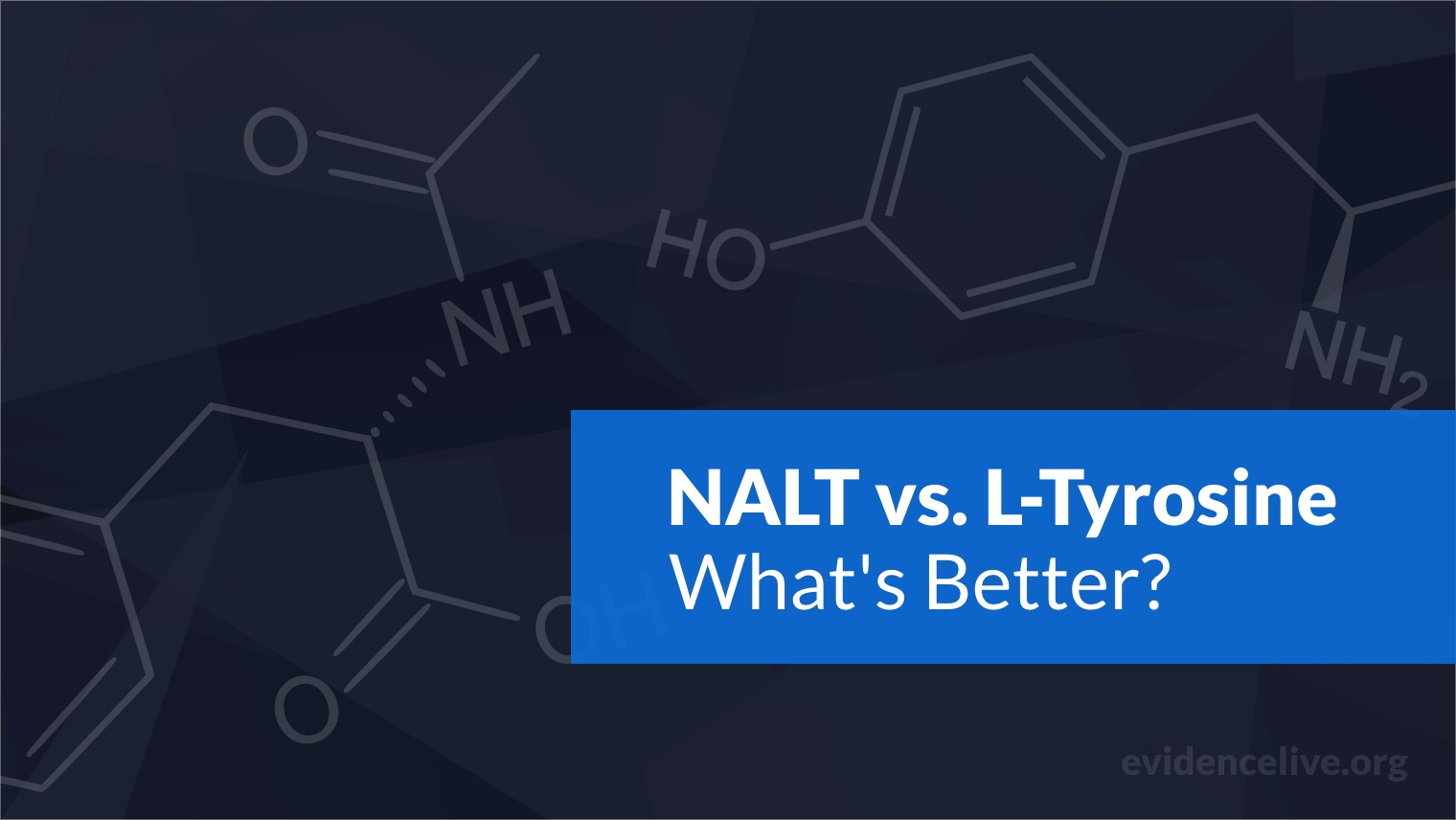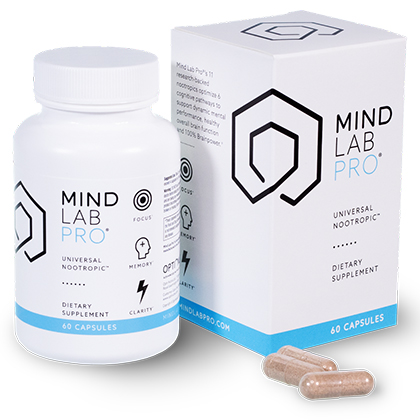One of the most prevalent natural nootropics is the nonessential amino acid tyrosine, as it influences the neurotransmitters dopamine, norepinephrine, epinephrine, and noradrenaline.
However, there is a lot of uncertainty encompassing the difference between forms N-Acetyl-L-Tyrosine and L-Tyrosine. Both nootropics work exceptionally to improve mental performance and cognitive function, but each form provides distinct benefits.
Before choosing a tyrosine supplement, it is essential to know the differences to achieve your desired results.
Mind Lab Pro is the most efficient supplement that contains N-Acetyl-L-Tyrosine as a component of the proven nootropic stack designed to improve cognitive function, natural energy, and overall brain health.
Contents
What’s The Difference Between NALT and L-Tyrosine?
When comparing the two different forms of tyrosine, they both provide promising effects and many similarities in their working mechanisms.
However, each offers its own benefits and downsides, essential for reliable nootropic results. For example, N-Acetyl-L-Tyrosine is known for better solubility, but L-Tyrosine may provide stronger effects.
N-Acetyl-L-Tyrosine (NALT)
N-Acetyl-L-Tyrosine, also called NALT or NAT, is a form of tyrosine with the amino acid bonded to an acetyl group.
For oral supplementation, the acetyl group has to be removed to produce tyrosine to increase levels in the body. However, the acetyl group also offers additional benefits that are practical for many people.
N-Acetyl-L-Tyrosine Benefits
Research shows that N-Acetyl-L-Tyrosine can aid with stress response and improve cognitive performance (1). In addition, many people experience more substantial results with NALT than with standard form.
There is evidence that NALT contributes to increased neurotransmitter biosynthesis, especially concerning catecholamine neurotransmitters responsible for mood, pleasure, and cognition.
N-Acetyl-L-Tyrosine offers one significant benefit over the standard form tyrosine, which is the dissolving effect directly resulting from increased solubility.
Since NALT dissolves more efficiently in liquid than L-Tyrosine, it can benefit those who add it to a beverage supplement or workout drink. The solubility can also cause the onset to be faster and improve the efficacy for immediate effect.
This makes it an excellent choice for acute effectiveness. For example, before work, exercise, study, or public speaking, drinking NALT in water or another beverage may be superior as it increases energetic feelings and moods.
Studies show that NALT works best when the participant or user is undergoing stressful conditions (2).
Several experts believe that NALT is better than any other form for physical and mental performance during stressful situations, like excessive temperatures, noisy surroundings, or intense exercise.
Some users also report that the side effects are lessened when using NALT over using the traditional form of tyrosine. In addition, it improves memory, stimulates focus, and synergizes well with other energy-boosting supplements and medications, including creatine HCL.
Disadvantages of N-Acetyl-L-Tyrosine
Since the acetyl portion of the compound must be removed before it can be converted into higher plasma tyrosine levels, it does not increase tyrosine as drastically as the other form.
As a result, some mistakenly believe that better water solubility means increased bioavailability. Although having a better solubility, the supplementation with NALT may require a higher dose.
Furthermore, many people think the water-soluble properties mean it more readily crosses the blood-brain barrier. However, at least one study found this idea misleading and concluded it did not cross more readily than the regular form (3).
L-Tyrosine
L-Tyrosine is one of the nonessential amino acids responsible for producing another amino acid called phenylalanine. This increases the synthesis of tyrosine and increases plasma tyrosine levels.
Therefore it provides usefulness for the support or a variety of body functions by acting as building blocks for proteins, the neurotransmitters dopamine, norepinephrine, and epinephrine.
L-Tyrosine Benefits
L-tyrosine is an effective form of tyrosine that can boost neuropsychological performance, improve outlook, and increase energy levels.
Its bioavailability makes it a superb choice to improve working memory and learning (4). Moreover, many users find improvements in both short and long-term working memory after regular use.
In addition, the ability to enhance cognitive function can also prevent cognitive decline related to age (5). This is because tyrosine amounts decrease with age, and the substance is suitable to support healthy brain function.
Supplementing l-tyrosine benefits older individuals to retain the quality of their thinking and may also help improve attention and alertness.
While there are many reasons for tyrosine supplementation, one supposed benefit that attracts users is the boost to productivity. The combination of effects helps to focus on tasks, process information, and keep knowledge organized and efficient.
This can indirectly reduce stress, and the boost to emotions can also alleviate some negative feelings.
For example, one study found that tyrosine supplementation helped with circulation in a stressful environment to help the body adapt, maintain temperature and heart rate (6).
In addition, it can help you manage a positive attitude enough to reduce the likelihood or even help treat depression.
Finally, L-tyrosine can also play a role in the quality of sleep. These effects on sleep and attitude are caused by increased dopamine, norepinephrine, epinephrine, and other neurotransmitters.
Disadvantages of L-Tyrosine
The nootropic L-tyrosine is not very soluble, making it harder to stack it with other supplements that work best when mixed into water or another liquid.
There are also some minor concerns about the negative side effects of high-dose tyrosine supplementation.
It also causes some people’s adverse reactions and negative outcomes, including nausea or headaches. Additionally, while it can battle fatigue, it can have the opposite effect for a small percentage of people.
N-Acetyl-L-Tyrosine or L-Tyrosine: The Comparison
To properly determine which nootropic supplement is better among N-Acetyl-L-Tyrosine vs L-Tyrosine, it is necessary to compare many of the essential features and properties of the two compounds.
Absorption and Bioavailability
This is the most discussed aspect of these two substances, and many people assume that the soluble qualities are the most important component.
However, even though N-Acetyl-L-Tyrosine is more soluble, it is not always the case that solubility means increased bioavailability.
This is because only a part of the NALT compound is converted into tyrosine. According to data on tyrosine and cysteine precursors, studies show that it is not as bioavailable as some people expect (7).
Conversely, L-tyrosine can have a long-lasting impact on the brain, increasing and elevating plasma tyrosine levels. Research shows it can increase concentrations by 200% or more (8).
In addition, the bioavailability means that this form may be superior to support healthy amounts of tyrosine for brain function and health, and it increases plasma tyrosine levels more than NALT.
Consequently, NALT doesn’t have as much bioavailability and the regular tyrosine, even with intravenous infusion.
Efficacy
To compare how effective the form of tyrosine is for mental performance, we have to look at what each type is recommended for. Since NALT has better solubility in water, it is better for stacking with other nootropics.
In addition, the powder’s absorption seems to be digested easier and will cause fewer side effects, which is also suitable for use within a complex nootropic formula.
The better solubility offers the same benefits but may have a faster onset, and it is an excellent option for boosting stress response.
On the other hand, L-Tyrosine is a great nootropic choice for more prolonged results. This is an attractive long-term option if you look for something to increase cognition and related faculties like memory.
It also offers the supposed benefit of a positive perspective, and the bioavailability means the dosage amount can be smaller than with NALT.
Dosage
The dosing amounts for the two types are almost the same but may offer different outcomes.
The recommended dosage for L-Tyrosine is lower because of the higher bioavailability, but generally, both types are taken at 350 to 500 mg, one to three times daily. However, doses over 1000 mg per day can cause more side effects.
You have to find the lowest single dose that works for the qualities you want for the best results. This will reduce the likelihood of adverse reactions or uncomfortable symptoms.
It is also most salutary to take L-Tyrosine with food because it will limit some of the action in the digestive system and aid in absorption.
Many people have also confirmed that it works better when the doses are taken with B Vitamins because the vitamins positively impact the absorption and utilization of tyrosine supplements.
Side Effects
Both nootropics, tyrosine sources can cause uncomfortable behavior, and it is crucial to start with the smallest amount to prevent over metabolism or distressing results.
Several users claim that the side effects are more frequent with l-tyrosine than with NALT. The most common side effects are nausea, heartburn, joint pain, and fatigue. In addition, stacking can sometimes cause cross results and create a high chance of additional side effects.
In addition, overstimulation of catecholamine synthesis can send catecholamines into overdrive.
This effect can lead to jitters and other over-stimulation signs by flooding dopamine and norepinephrine, two catecholamine neurotransmitters. In addition, it can lead to poor sleep, especially when consumed in the afternoon.
Price
While you can get both nootropics at an affordable price, NALT holds a higher cost compared to the other option.
This is because the acetyl role takes more time and resources to attach to the original nootropic.
Therefore, when comparing both compounds from the same company, the NALT choice is usually around 50% more expensive.
Which Nootropic Is Better To Choose?
Both types of tyrosine nootropic can be great for stress, cognition, and the brain’s health. Each one offers similar effects and unique benefits.
L-Tyrosine is excellent for sustained behavior outcomes and long-term brain and cognitive boosts, while NALT is a good choice for immediate effects and stacking.
While many products can boost your well-being and improve your life, we recommend Mind Lab Pro as the best tyrosine supplement because it offers synergistic ingredients that target every component of the brain for well-rounded results and profound nootropic outcomes.
Mind Lab Pro is the best supplement containing tyrosine that can help you achieve the most significant effects for your cognitive health by balancing neurotransmitters using natural and powerful synergistic ingredients.


